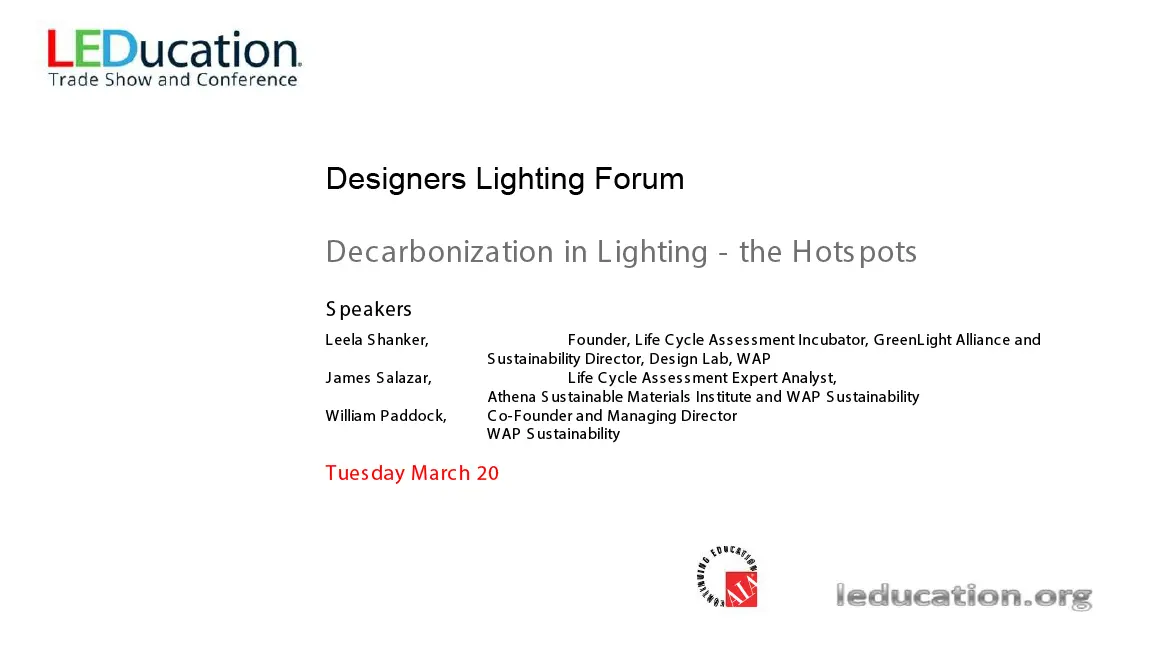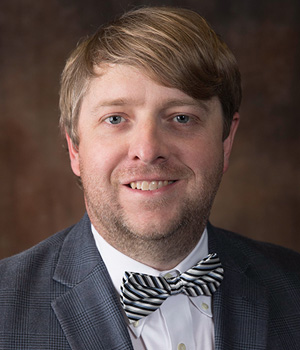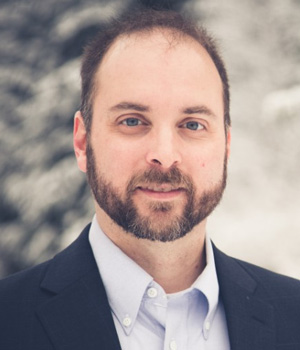Leela Shanker, WAP Sustainability | William Paddock, WAP Sustainability | James Salazar, WAP Sustainability
Location: Gramercy
TuesdayMarch 19, 2024
6:30 pm - 7:30 pm EST
Credits 1 LU | HSW
Intermediate
In New York City, 2024 marks the introduction of financial penalties under Local Law 97 for exceeding building C02 emission limits; providing legislative and commercial imperatives for carbon footprint measurement. How does lighting contribute to achieving decarbonization goals of governments and corporate entities under legislation and “Net Zero” challenges set by construction partners in other disciplines, such as Architecture 2030 and MEP2040? This session presents the first results of the Life Cycle Assessment Incubator of the GreenLight Alliance and IALD, an industry-led pilot to develop a consistent framework for measuring embodied and operational carbon of five key architectural luminaires.
Attendees should have an understanding of basic lighting principles and industry stakeholders assumed. Awareness of lighting industry structure and products will support understanding of the commercial discussion.
Learning Objectives
- Outline current status of metrics and approaches to measuring the carbon footprint of luminaires and lighting strategies
- Outline relative carbon impact of 5 key architectural luminaires
- Understand practical issues in using life cycle assessment data to set decarbonization targets for lighting
- Compare decarbonization initiatives progressing in other construction disciplines internationally

Speakers

Leela Shanker leads the Design Lab with WAP Sustainability. Synthesizing architectural design, sustainability analytical frameworks and speculative material investigations, the Lab implements strategies that progress decarbonization, circularity and material health in the built environment. Based in New York, with collaborators globally, Shanker and WAP's team develop pilot initiatives between leading stakeholders from design, manufacturing and real estate.
Through the GreenLight Alliance - an international network of lighting professionals progressing industry-led standards, research and advocacy - she founded the Lighting Industry Life Cycle Assessment Incubator while practicing as a lighting designer with consulting engineering firm BR+A. She holds a M.Arch (Hons) and MFA - Lighting Design from Parsons School of Design and Bachelors of Law and Commerce from Sydney University.
Shanker continues to advise the Pacific Northwest National Laboratory (U.S. Department of Energy) as technical expert to their Life Cycle Assessment and light research team and is a Steering Committee member of the American Institute of Architects’ Decarbonization Subcommittee and Carbon Leadership Forum NY chapters.
As Founder of non-profit, Flint Collective NYC Inc, her work has been awarded by the IES with a Special Citation for Lighting as a Tool for Social Impact. She is a current member of the Social Architecture track of the New Museum’s NEW INC incubator.

William Paddock is the founder & managing director of WAP Sustainability, a global provider of sustainability services that include carbon accounting, lifecycle assessments, toxicological assessments, product transparency programs, and supply chain sustainability services. He is widely recognized as an expert at the measurement of sustainability in products and operations. His clients range from Fortune 100's to innovative start-ups, retailers to private equity firms, insurance companies to tech companies. Since 2008, William has been helping organizations understand sustainability and navigate lower carbon pursuits. Over his career he has accumulated professional credentials carbon accounting from the Greenhouse Gas Management Institute (GHGMI) and EcoCanada (EP(ghg)) and been awarded the Distinguished Alumni Award from GHGMI. Paddock is a Board Member for the Carbon Leadership Forum (CLF) (outgoing), American Center for Life Cycle Assessment (ACLCA), and The Model Forest Policy program. He services in a variety of advisory roles including a start-up mentor for RMI's Third Derivative Accelerator, EcoSystem Partner for the International Living Future Institute (ILFI) - Living Product Challenge (LPC), Past Chair of the LEED Materials and Resource Technical Advisory Committee (MR TAG), and Technical Committee Member to the Health Product Declaration Collaborative (HPDC).

James Salazar is an internationally regarded expert in the field life cycle assessment, serving on the United States ISO technical committee (TC207) tasked with developing international standards on LCA practice. In his current role as Sustainability Director with WAP Sustainability, James manages LCA and Environmental Product Declaration (EPD) projects, with a focus on large-scale industry projects to support emerging buy-clean requirements across North America. Most recently, Salazar is leading the LCA analysis of five key architectural performance luminaires, producing the first Industry-Average EPDs for the lighting industry through the Greenlight Alliance LCA Incubator pilot. As former Director of EPD Services with the Athena Sustainable Materials Institute and Principal of Coldstream Consulting, James has developed LCAs and EPDs for a range of building products. In addition to EPD development, James has also served as a methodology advisor for Athena’s Impact Estimator for Buildings software. Salazar has also developed LCA-based calculators for building materials including concrete and advised on material-specific issues such as biogenic carbon. The concrete EPD software developed by Coldstream Consulting is currently used by multiple industry associations (PCI, ACPA, CRMCA, CPCI) to produce concrete EPDs as well as several hundred concrete facilities. Salazar is a member of the North American Product Category Rules Committee reviewing luminaire life cycle assessment frameworks.
